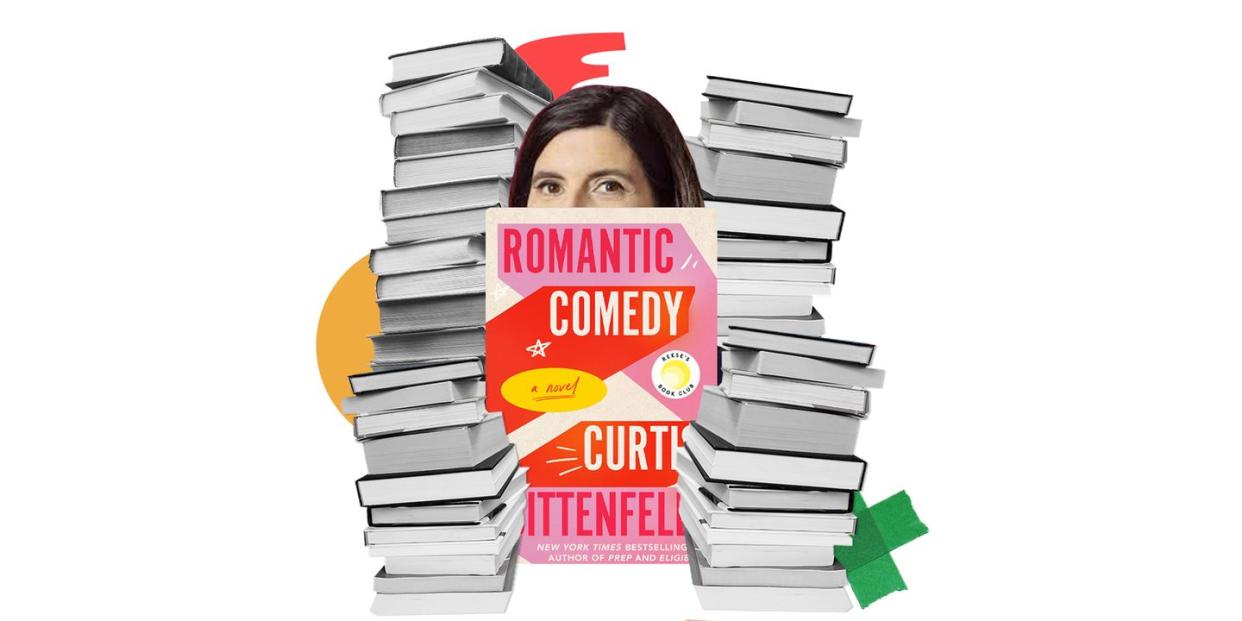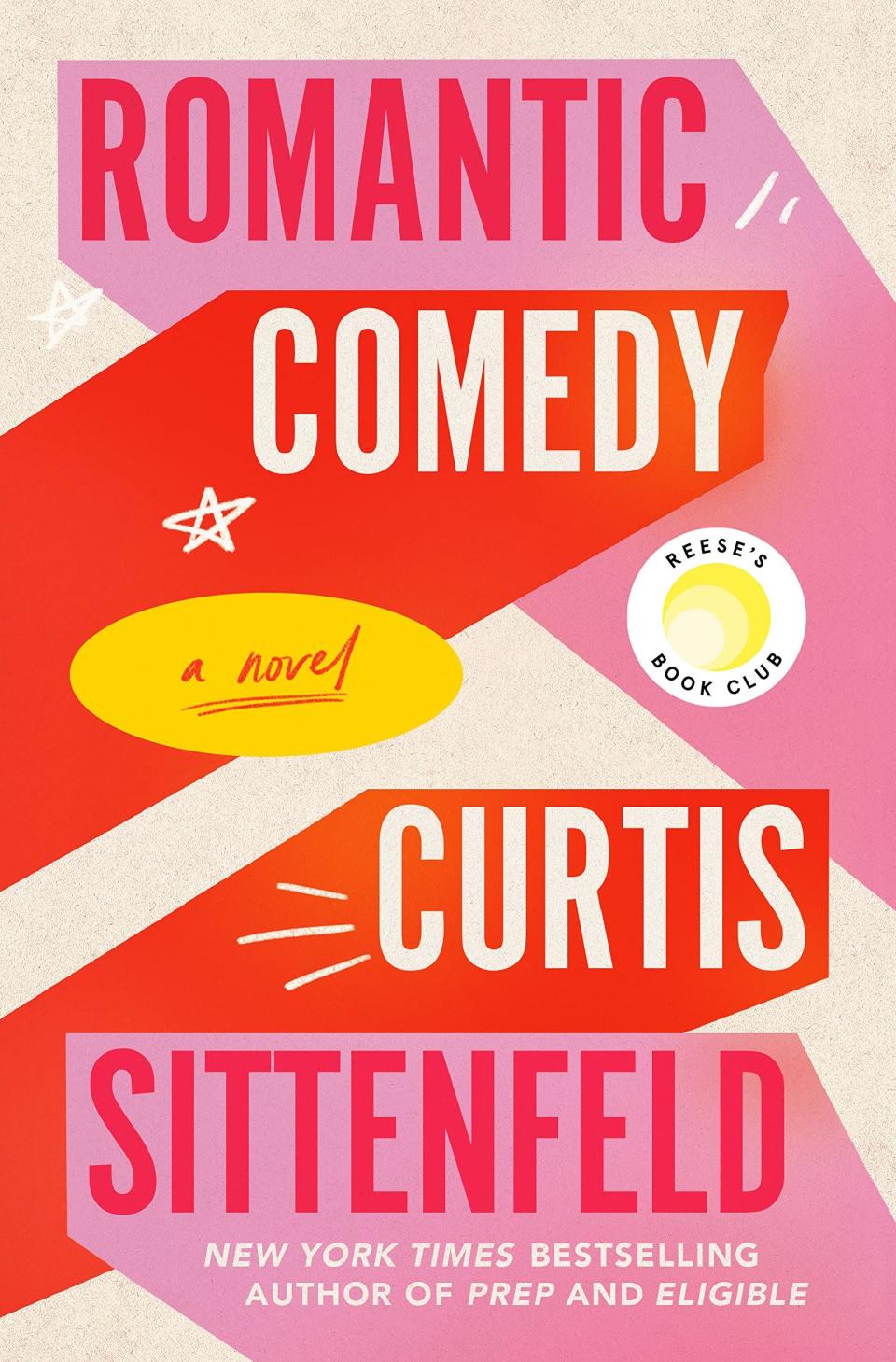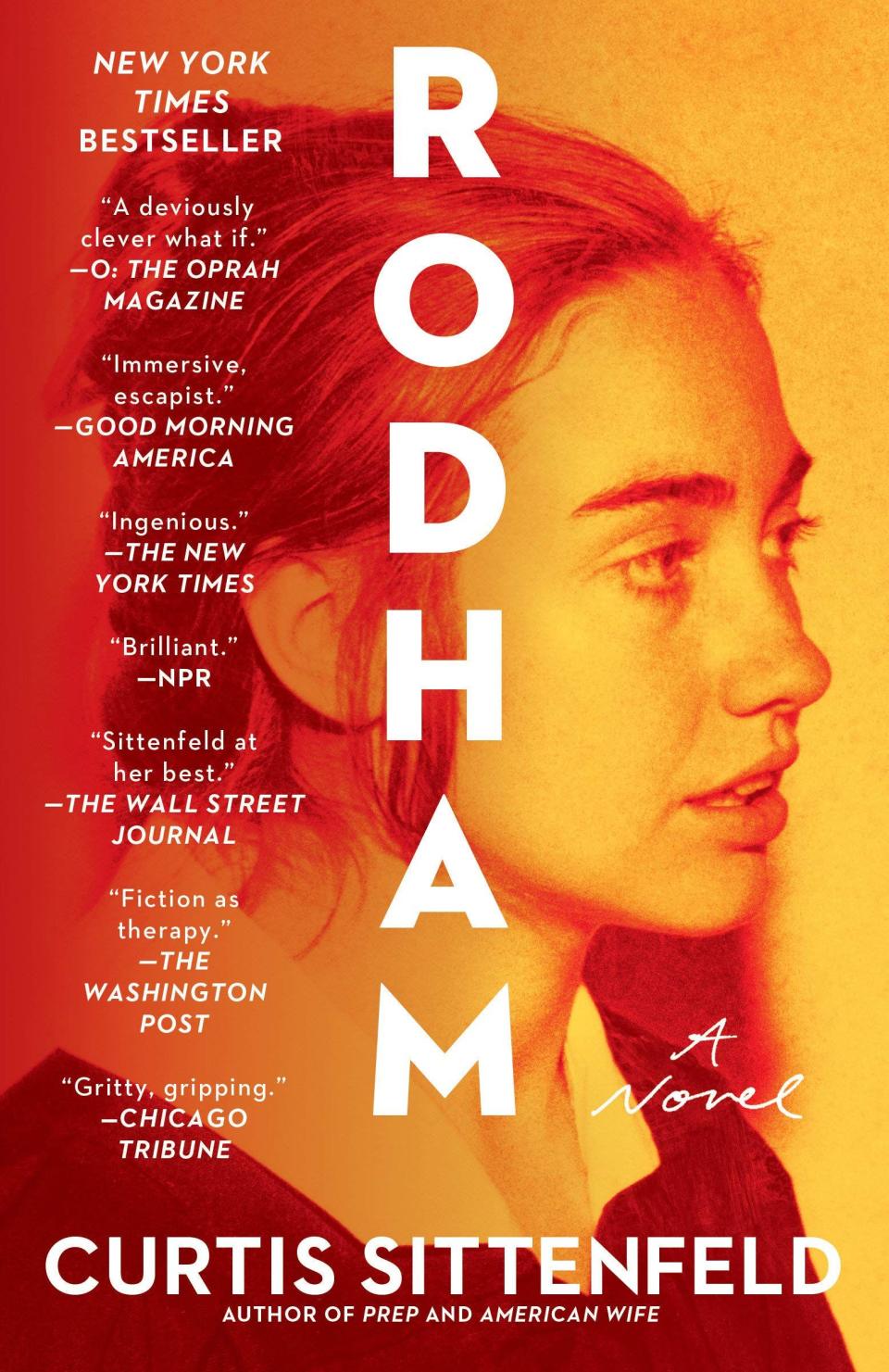Curtis Sittenfeld Can't Be Contained

- Oops!Something went wrong.Please try again later.
"Hearst Magazines and Yahoo may earn commission or revenue on some items through these links."
“Then how about this—” someone challenges Sally Milz, Curtis Sittenfeld’s protagonist in Romantic Comedy, “can you define cheese for me? Because I still haven’t figured out, after two decades, where the line is between cheese and emotional extravagance that’s acceptable. What makes a song or a movie or a moment in real life land on one side or the other?”
What a question for Sally, who’s spent years dramatizing—and yes, also deriding—pop culture as a veteran writer on a fictional iteration of Saturday Night Live (The Night Owls, or TNO). What a question for Sittenfeld, whose impressively varied collection of work bestrides both sides of the literary/commercial fiction binary—that oft-contested dichotomy that skeptics feel shouldn’t exist, doesn’t exist, or isn’t well-defined enough to establish its existence one way or the other.
What is literary fiction? What is commercial fiction? Are they actually different? A variation of discourse around this alleged binary has been going for years. It takes different forms, but it goes something like this: people, often writers, think of novels and their authors (or authors and their novels) as belonging roughly in one bucket or the other. When pressed to define the parameters of these buckets, things get nebulous, and sometimes devolve into a quite sexist divide, especially because a colloquial cousin of “commercial fiction” is “women’s fiction.” In a 2012 essay in The New York Times, Meg Wolitzer wrote, “If The Marriage Plot, by Jeffrey Eugenides, had been written by a woman yet still had the same title and wedding ring on its cover, would it have received a great deal of serious literary attention? Or would this novel (which I loved) have been relegated to ‘Women’s Fiction,’ that close-quartered lower shelf where books emphasizing relationships and the interior lives of women are often relegated?” She adds, “Will ‘Women’s Fiction’ become such an absurd category it’s phased out entirely?”
The term women’s fiction is especially laughable when you consider who tends to read fiction most voraciously: women. As Adam O’Fallon Price, one of the contributors to this conversation, aptly notes in the Paris Review, “‘Fiction that appeals more to women than men is, as we know, ‘fiction.’”

$15.99
amazon.com
Although not everyone who subscribes to this distinction between literary and commercial fiction sees the latter as interchangeable with “women’s fiction,” sometimes the lines get blurred. Other times, it’s a cluster of styles and “vibes” (for lack of a better word) that determine a book’s label. Conversational versus elevated prose. Linguistic acrobatics. Detachment versus sincerity. Maybe even sales numbers; the term “popular fiction” sometimes gets thrown around as a synonym for commercial fiction. The presence or absence of happiness and fun have turned up in this mix, too. Surely cheesiness would go in the commercial bucket, making the recurring question in Romantic Comedy (what is cheesiness, and how much is allowed?) quite relevant to the topic of commercial and literary fiction. It should also be noted that, in addition to any pretension on part of readers, marketing and sales are drivers of genre labeling. In any event, it’s a topic that’s often discussed and seldom resolved.
In his Paris Review essay, O’Fallon Price notes how Sittenfeld has “challenged this tiresome paradigm,” situating her as the lead in a troupe of writers who are “both popular and literary and seem to have no problem standing with a foot in each category.” Price contrasts Sittenfeld’s reception against writers like Alice Munro and Marilynne Robinson. “Domestic” topics and female-identifying main characters notwithstanding, Munro and Robinson are not cast off to the women’s fiction pile.
Others who might stand alongside Sittenfeld in the literary overlay are Gillian Flynn and Sally Rooney, though the latter seems to be more unequivocally received the literary camp, despite her facility with commercial themes (often encompassing anything from young people keeping jobs to divorce, death, and falling in and out of love). And then there are those who are thought of as writers of women’s fiction “almost as a function of their popularity,” says O’Fallon Price. A book by a female-identifying writer that sells widely at airport newsstands might have to jump through more hoops, critically or otherwise, to be considered literary—although this may be changing as writers with more literary reputations, like Yaa Gyasi and Rebecca Makkai, populate those same display tables.
Sittenfeld’s eight books span a capacious gamut. Her debut novel, Prep, which appeared on The New York Times’ Best Books of 2005 list alongside work by Zadie Smith, Haruki Murakami, and Joan Didion, is about an adolescent girl at a boarding school; her most recent book before Romantic Comedy, Rodham, is about Hillary Rodham Clinton (if she’d never become a Clinton).

$15.75
amazon.com
If someone very deferential to the commercial/literary binary were to weigh in, they might put Rodham in the literary bucket and Romantic Comedy in the commercial bucket, even though Rodham offers some of the appealing characteristics of popular fiction and Romantic Comedy offers some of the curiosity and eloquence Sittenfeld relied on to write her more “serious” novels. (Even this summary of biases falls prey to the very same biases.) They might think back to Prep, and how difficult it was to pin down a novel—from the aughts, no less—that treats its adolescent protagonist and her concerns seriously, and with serious prose. They might also be confused by Sittenfeld’s choice to write Romantic Comedy after writing some of her more literary work, because when one adheres strictly to the literary/commercial binary, one inevitably sees one as better and more advanced—rarer and more deserving of praise. Why would someone demonstrably capable of literary fiction ever mess with popular fiction?
One possibility is that they simply don’t care. In a conversation with Bethanne Patrick for the Los Angeles Times about Romantic Comedy, Sittenfeld recalls asking herself, “Am I allowed to write a book that has such a purely fun premise? And then I realized the answer to my own question was, yes, I am allowed to. I give myself permission.” The quote implies a recognition of the literary/commercial conversation, but also a distinct choice to remain unbothered by it, deft as Sittenfeld is in both modes.
In its recent review of the book, satirizing the artificial literary/commercial dichotomy, The Star Tribune joked, “What's this? Curtis Sittenfeld has written a romantic comedy? Wait, isn't she a serious literary writer, a graduate of Stanford University and the Iowa Writers Workshop whose work has appeared in The New Yorker and Vanity Fair? A writer whose bestselling novels (including American Wife and Prep) have been translated into 30 languages, named to many ‘best of the year’ lists and optioned for TV shows and movies? That Curtis Sittenfeld is writing a romcom?”
Romantic Comedy, as it so happens, is a romantic comedy. The novel kicks off at a weekly pitch meeting attended by Noah Brewster, a celebrity musician in residence at TNO that week. During the meeting, Sally proposes a sketch that casts Noah as a literal cheesemonger, poking fun at the sentimentality of his own songs. It’s at the after-after party following the show that Noah makes his petition for the definition of cheesiness. By this time, Sally and Noah have shared an intense week—as all weeks are at TNO—full of rewrites, rehearsals, and the moments in between the creation and the production of instant, direct-to-consumer art. But it barely occurs to Sally that Noah might be seriously interested in her. In a real way, sexism and an allergy to sentimentality pose significant obstacles to Sally’s happiness. It’s a dynamic that feels evocative of the ennoblement of literary over commercial fiction. It insists that sincerity be mitigated by detachment and cynicism.
When Noah asks Sally whether she’d like it or hate it if a man showed up to serenade her in public, she says, “Good question. I think maybe I’d aspire to hate it but secretly love it.” Noah presses, “Why would it be better to hate it? Because it’s cheesy?”
Good question, indeed. So what accounts for the aversion to cheese, literary or otherwise? Maybe it’s an attempt to lose the sugary complacency, intellectual neglect, even the indifference to harm that sometimes comes with love stories or other earnest narratives. But not all works of commercial, popular, or “women’s fiction” bear these traits, nor does every happy ending. Okay, so maybe it’s just an over-application of a legitimate concern. Or maybe it’s snobbism. Or sexism.
On Twitter recently, Sittenfeld quipped about her audience, “A journalist asked if I’m worried that my new novel’s title or cover will deter men but I’m not because all seven of my male readers are very loyal and I actually think they’ll like it.”
Readers (including the dozens of male-presenting people who responded to her tweet) will like it. And people interested in this binary conversation should read it, not in small part because Sittenfeld sets up a story whose plot itself asks Noah’s question. But you’ll have to read to the end to figure out how Sally, who is in the business of derision, and Sittenfeld, who is in the business of imagination, might answer it.
You Might Also Like

